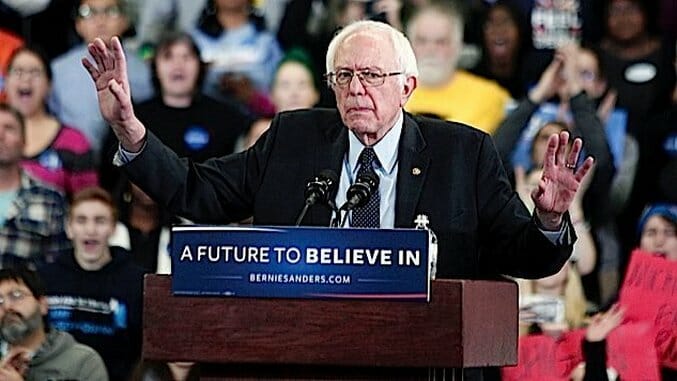Let’s Debunk a Very Stupid Medicare For All Talking Point
Photo courtesy of Getty
Over two nights of Democratic primary debates, CNN, and in particular Jake Tapper, seemed obsessed with the idea that Medicare For All entails “throwing people off their insurance.” Here’s how Tapper introduced the idea in a question to Sanders at the start of Tuesday night’s debate:
You support Medicare for All, which would eventually take private health insurance away for more than 150 million Americans in exchange for government sponsored healthcare for everyone.
The conservative candidates, like Tim Ryan and Joe Biden, doubled down on the idea and threw in unions for good measure. Here was Ryan in night one:
This plan that’s being offered by Senator Warren and Senator Sanders will tell those union members who gave away wages in order to get good healthcare that they’re going to lose their healthcare because Washington’s going to come in and tell them they got a better plan.
And Biden, a night later:
Secondly, it will require middle-class taxes to go up, not down. Thirdly, it will eliminate employer-based insurance. And fourthly, what happens in the meantime?
Now, there’s nobody on the planet who knows more about the concept of Medicare for All than Tim Faust, who literally wrote the book on single payer and has been one of the country’s strongest advocates for a universal plan. He managed to debunk the entire notion during Wednesday’s debate with a single tweet:
me, a union member after m4a: aaahhhh son of a gun…. i lost my insurance and now i have more money and bargaining power… also i still have insurance
— kill tim faust (@crulge) August 1, 2019
That’s really all you need to know. Laid out in simple fashion:
1. Workers who “lose” private health insurance will gain a government program that gives them freedom to choose their doctors and hospitals—a freedom they lack under private plans.
2. Because their companies no longer have to provide insurance for them, they will make more money.
3. Taxes may go up, but overall healthcare costs will go down since M4A frees them from premiums, deductibles, co-pays, coinsurance, and other costs that no longer exist in a free-at-point-of-service plan. These savings, for the average American, will more than offset any tax hike.
4. As Faust said, they can now negotiate for higher wages because healthcare is taken out of the employer-employee relationship.
5. Every worker will have more freedom to leave his or her job when it’s not tied to healthcare, thus giving all workers, and unions in particular, far more power.
Of the candidates on stage, Bill DeBlasio came the closest to elucidating this point:
I don’t know what the vice president and the senator are talking about. The folks I talk to about health insurance say that their health insurance isn’t working for them….
There’s this mythology that somehow all of these folks are in love with their insurance in America. What I hear from union members and from hard-working, middle-class people is they wish they had better insurance and they’re angry at private insurance companies that skim all the profits off the top and make it impossible for everyday people to get coverage…
Later, he said he didn’t understand “why Democrats on this stage are fearmongering about universal health care. It makes no sense.”
DeBlasio kept this attack to the concept of insurance costs and coverage, and didn’t extend it to the larger point about worker freedoms, but at least said that the idea of workers loving their private insurance is bogus. It is, quite blatantly, a talking point that is employed by people with financial ties to the pharmaceutical and insurance industries. Some of those people are Republicans, but as we’ve seen, some are not.
Medicare for All will come in for more and more criticism the closer it gets to being passed, and it’s important to identify which arguments are being made in good faith and which are not. The concept of workers in America revolting because M4A costs them their private insurance plans falls on the side of “bad faith,” and it’s time to stop entertaining it. Workers will save money on the tax-healthcare cost balance, they will have more freedom to seek better jobs without the tether of employer-based insurance plans, and as a collective they will have more bargaining power to seek higher wages (and the companies, incidentally, will have more money to pay them).
If we don’t understand that, it makes it more likely that we’ll be persuaded by the simplistic version of the truth that the Jake Tappers of the world love to push, which is that millions of people will “lose” insurance. They’re not losing anything—they’re keeping insurance, and gaining so much more.







































